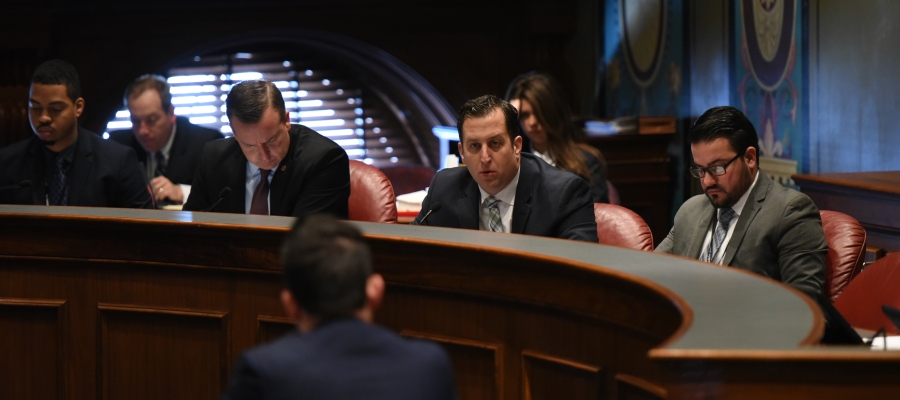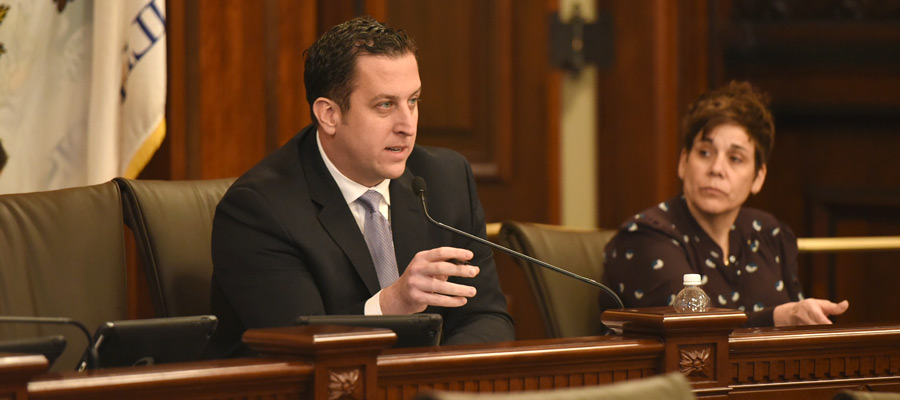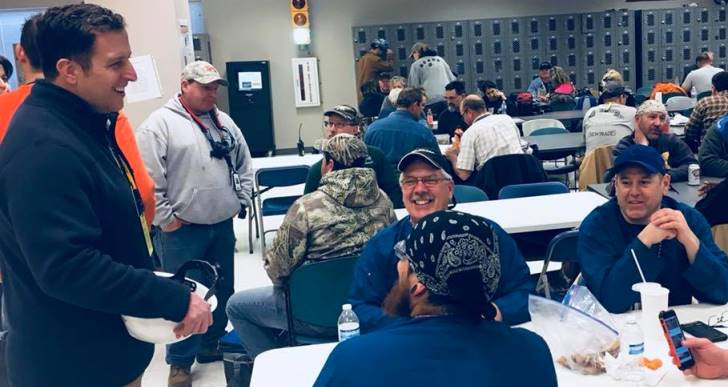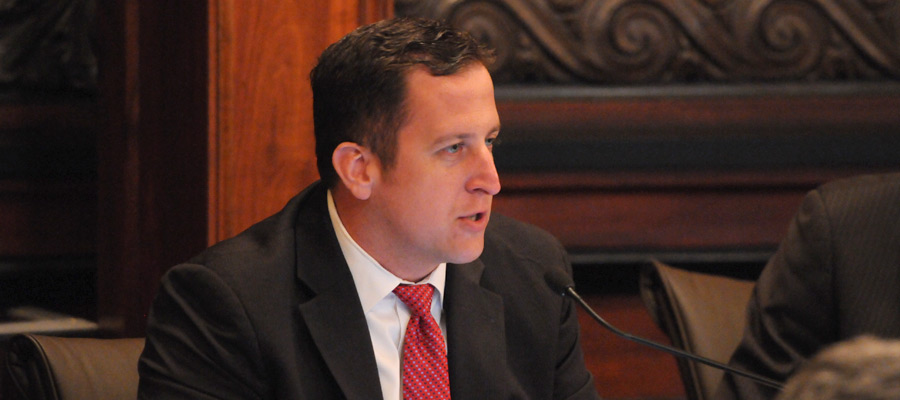- Details
- Category: Press Releases
 CHICAGO— Illinois now has a bipartisan budget in place, thanks to support from State Senator Michael E. Hastings.
CHICAGO— Illinois now has a bipartisan budget in place, thanks to support from State Senator Michael E. Hastings.
The balanced budget invests $38.5 billion in working- and middle-class families across the state and was signed into law Monday morning.
“This bipartisan budget prioritizes the working families across the south suburbs by providing stability, certainty and predictability to area residents,” Hastings said. “This budget saves programs for the most vulnerable that were on the governor’s chopping block and increases funding for our highest-need schools. That’s a win for Illinois.”
The budget includes a $25 million increase for higher education, $350 more in K-12 education funding and $120 million in revenue dedicated to local governments. The state’s group health insurance program is also fully funded.
The budget also includes funding for AIM HIGH, a new and innovative tuition assistance grant program that is aimed at attracting Illinois students from middle class families to state universities.
“The most important investment we can make as a state is in providing our children the best educational opportunities to flourish,” Hastings said. “Properly funding higher education, K-12 and early education puts our children on a pathway to success. Our state has first-class higher education facilities in our own back yard and this commonsense grant program will allow Illinois’ best and brightest to take utilize them.”
House Bill 109 passed the Senate and House with bipartisan support.
- Details
- Category: Press Releases
 SPRINGFIELD – Computer hacking is a growing societal threat, and the perpetrators are willing to cross any lines – including into school databases.
SPRINGFIELD – Computer hacking is a growing societal threat, and the perpetrators are willing to cross any lines – including into school databases.
That’s why State Senator Michael E. Hastings (D-Tinley Park) passed Senate Bill 3201 Monday, giving parents added recourse to protect their children and their data.
The measure requires schools to notify the parent of a student within 48 hours after discovery of a breach of security that results in the unauthorized release, disclosure or acquisition of information from a student record.
“We live in a technology-driven society, and it is increasingly utilized in the daily management of schools,” Hastings said. “Unfortunately technology can sometimes make our students’ records vulnerable to cyber-breaches. When misfortune strikes it is vital that parents have ample notice to protect their children’s private information.”
Last year, Hastings created the Student Online Personal Protection Act which prohibits the operator of an educational website, online service or application from selling or renting students’ information to third-party vendors.
This prevents educational institutions from gathering information to engage in targeted advertising, and it prevents the gathering of student portfolios for any purpose that is not for the direct benefit and enhancement of the child’s learning experience.
“The way our children learn has changed, we recognize that and we do not want to change that,” Hastings said. “But parents and educators should not have to be worried about how companies use marketing tactics to target our children, so we are working to safeguard our students’ privacy rights.”
Senate Bill 3201 passed the Senate with bipartisan support and now moves to the House for consideration.
- Details
- Category: Press Releases
 State Senator Michael E. Hastings (D-Tinley Park) kicked off his statewide energy tour this week in the south suburbs at the Braidwood Generating Station. As the newly appointed chairman of the Senate’s Energy and Public Utilities Committee, he started this series of tours and educational visits to help put his role as energy chairman into perspective. Hastings met with the employees at the Braidwood station to thank them for their hard-work to ensure the lights stay on in homes across Illinois
State Senator Michael E. Hastings (D-Tinley Park) kicked off his statewide energy tour this week in the south suburbs at the Braidwood Generating Station. As the newly appointed chairman of the Senate’s Energy and Public Utilities Committee, he started this series of tours and educational visits to help put his role as energy chairman into perspective. Hastings met with the employees at the Braidwood station to thank them for their hard-work to ensure the lights stay on in homes across Illinois
BRAIDWOOD – State Senator Michael E. Hastings (D-Tinley Park) kicked off his statewide energy tour this week in the south suburbs at the Braidwood Generating Station.
Hastings, newly appointed chairman of the Senate’s Energy and Public Utilities Committee, started this series of tours and educational visits to help put his role as energy chairman into perspective.
“I’m a firm believer that the only way to make responsible and educated decisions is to tour these facilities to ensure we craft policies that modernize and safeguard Illinois’ energy infrastructure,” Hastings said. “As the new energy chairman, I’m eager to learn more and gain a complete picture on how the energy decisions we make in Springfield impact families across Illinois.”
The power plant employs workers across the south suburbs, including many residents from Grundy and Kankakee counties, as well as the 19th state senate district which Hastings represents.
“I appreciate and value the time employees and supervisors took to help me better understand the impact Braidwood has in maintaining Illinois’ energy independence,” Hastings said. “The hard-working employees at the Braidwood station work endlessly to help ensure the lights stay on in our homes.”
The two nuclear reactors at the power plant produce more than 2,389 megawatts of clean, carbon-free energy which is enough electricity to power 2 million homes.
“All of us at Braidwood station were honored to host Senator Hastings and his team,” said Amy Ferko, Plant Manager of Braidwood Generating Station. “We are proud of what we do to generate safe and reliable energy and of the economic impact we have here in the local community. We look forward to working with the senator and the energy committee to further develop and broaden understanding of the benefits of nuclear energy.”
Since the Braidwood tour, Hastings has visited the Kincaid Power Station and is working on scheduling additional tours throughout the state including a tour in Coffeen in the coming weeks.
- Details
- Category: Press Releases
 SPRINGFIELD- State Senator Michael E. Hastings (D-Tinley Park) supported a monumental measure Wednesday to keep communities across the Southland safe by facing the nationwide epidemic of gun violence.
SPRINGFIELD- State Senator Michael E. Hastings (D-Tinley Park) supported a monumental measure Wednesday to keep communities across the Southland safe by facing the nationwide epidemic of gun violence.
Hastings voted for House Bill 772, which aims to take firearms out of the hands of persons believed dangerous by their families or law enforcement.
“Prior to many of these mass shootings, the killer had exhibited dangerous behavior and raised red flags before committing the atrocities,” Hastings said. “This measure gives family members and law enforcement the power to address those red flags and seek assistance if someone with access to guns is believed to be a threat to themselves or the general public.
“This new procedure could literally determine whether hundreds live or die.”
Hastings said House Bill 772, called the Lethal Violence Order of Protection Act, gives those closest to potentially dangerous subjects an added level of protection and gives law enforcement a greater ability to serve the public interest.
After a person has been reported as dangerous, if the court finds evidence to show the individual is a danger to themselves or the public, a judge can require that person to temporarily turn over any firearms in his or her possession.
Hastings, who earned the Bronze Star for his meritorious service in a combat zone and advanced to the rank of Captain in the U.S. Army, said the move is about public safety.
“The right to bear arms is a constitutional right. But we also must consider the importance of safety,” Hastings said. “I’m a strong supporter of responsible gun use. When I was in the service I used weapons to defend our nation’s honor and democratic values. This measure simply ensures we take precautions to keep our communities safe.”
House Bill 772 passed the Senate with bipartisan support and now moves to the House for consideration.
More Articles …
Page 52 of 88


